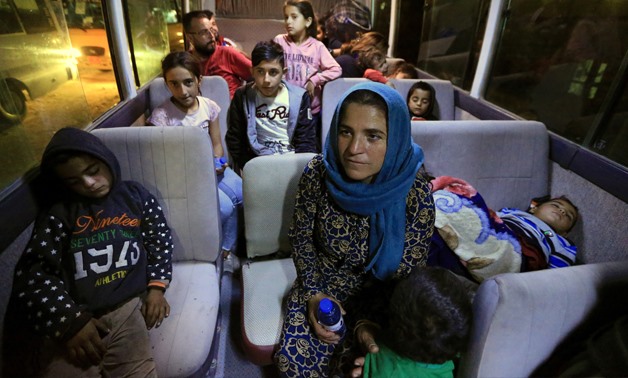
Syrian displaced families, who fled violence after the Turkish offensive against Syria, sit in a bus after arrival at a refugee camp in Bardarash on the outskirts of Dohuk, Iraq October 17, 2019. REUTERS/Ari Jalal
GENEVA - 18 October 2019: For the fourth consecutive day, UNHCR, the UN refugee agency, has been receiving hundreds refugees crossing the border into Iraq from northeast Syria. Refugees mainly come from towns in northern Syria - Kobani, Amoda and Qamishly and surrounding villages.
As of this morning, over 1,600 Syrian refugees have been transported from the border areas to Bardarash refugee camp, some 150 kilometers east of Syria-Iraq border.
The site has been prepped to receive the latest arrivals fleeing the fighting in northern Syria.
Newly arrived refugees told our staff that it took them days to get to the border as they fled amid shelling and fighting. Most of the new arrivals are women, children and elderly. Their general physical condition appears to be good, but some required psychosocial support.
In support of the response led by local authorities, our teams and those of other aid agencies and partners have been working round the clock to transport refugees to the Bardarash camp and meet their immediate needs.
Family tents are being pitched to provide shelter, water and sanitation systems have been put in place together with other basic facilities.
Upon arrival refugees are given hot meals, water, basic aid items including mattresses, blankets, kitchen sets, jerrycans and other items. Medical teams with ambulances and a mobile medical unit are present to provide medical assistance if needed. Our teams are working with partners to provide services needed including pyscho-social support and protection services. The refugees are registered using biometric iris-scanning and their specific needs are assessed to determine what kind of assistance they may require.
Meanwhile in Syria, after a week of violence in country’s northeast, we and our partners have been able so far to provide life-saving assistance to nearly 60,000 newly displaced Syrians as well as to those forced to flee from one camp to another.
Nearly 23,000 people have received core relief and winter items in the camps. UNHCR also provided same assistance to another 35,700 living in collective shelters and host communities.
The UN currently estimates some 166,000 people have been forced to flee their homes over the past seven days. Newly displaced families continue to seek shelter in camps, makeshift sites, communal shelters, with family, friends or acquaintances. Many of them have been displaced multiple times from one area to another in Al-Hassakeh, Tal Tamer and Raqqa.
Where possible, UNHCR teams conduct protection assessments and our response continues. Our protection partners identify those in need of specialized care and attention every day.
Given the new and significant humanitarian needs, UNHCR reiterates its calls for the protection of civilians and civilian infrastructure. It is also critical that humanitarian workers are given unfettered humanitarian access to reach those newly displaced and assist them wherever this is required.


Comments
Leave a Comment